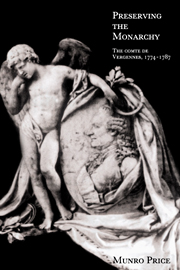Book contents
- Frontmatter
- Contents
- Acknowledgements
- List of abbreviations
- Introduction
- 1 Recalled to life
- 2 The question of reform: Turgot, Necker, and Vergennes
- 3 Vergennes as first minister: the comité des finances
- 4 The fall of the comité des finances
- 5 The politics of judicial reform
- 6 The politics of retrenchment, 1783–1785
- 7 The ministry, its divisions, and the parlement of Paris, 1785–1786
- 8 The Dutch imbroglio
- 9 Death and posterity
- Bibliography
- Index
9 - Death and posterity
Published online by Cambridge University Press: 31 October 2009
- Frontmatter
- Contents
- Acknowledgements
- List of abbreviations
- Introduction
- 1 Recalled to life
- 2 The question of reform: Turgot, Necker, and Vergennes
- 3 Vergennes as first minister: the comité des finances
- 4 The fall of the comité des finances
- 5 The politics of judicial reform
- 6 The politics of retrenchment, 1783–1785
- 7 The ministry, its divisions, and the parlement of Paris, 1785–1786
- 8 The Dutch imbroglio
- 9 Death and posterity
- Bibliography
- Index
Summary
In August 1786, Calonne presented Louis XVI with a major reform programme that, he maintained, was the only way to solve the monarchy's increasing financial difficulties. In its essentials, this plan was very similar to that adopted by the comité des finances in February 1783. In the spirit of the comité's earlier views on the reform of direct taxation, Calonne proposed to abolish the vingtièmes and replace them by a single universal land tax, payable on all property without exceptions or privileges. In the area of indirect taxation, too, Calonne's proposed abolition of internal customs barriers took up Vergennes' and d'Ormesson's preoccupations of three years earlier. Finally, the timing of Calonne's plan was significant: he was attempting to use the imminent expiry of the 3rd vingtième as an opportunity for introducing wide-ranging reform, much as d'Ormesson had tried to do three years earlier.
There was, however, one important difference between Calonne's programme and that of the comité des finances. Calonne was bitterly unpopular with the senior magistrates and knew that his proposals had no chance of success if they were submitted to the parlement of Paris. He therefore recommended to the king the convocation of a nominated assembly of notables as a means of circumventing the inevitable hostility of the sovereign courts. There was, in fact, a clear link between this radical decision and Calonne's final realisation of the impossibility of dealing with the parlements. It is probable that Calonne only took it after the failure of a final attempt to dislodge d'Aligre in mid-1786.
- Type
- Chapter
- Information
- Preserving the MonarchyThe Comte de Vergennes 1774–1787, pp. 223 - 241Publisher: Cambridge University PressPrint publication year: 1995

